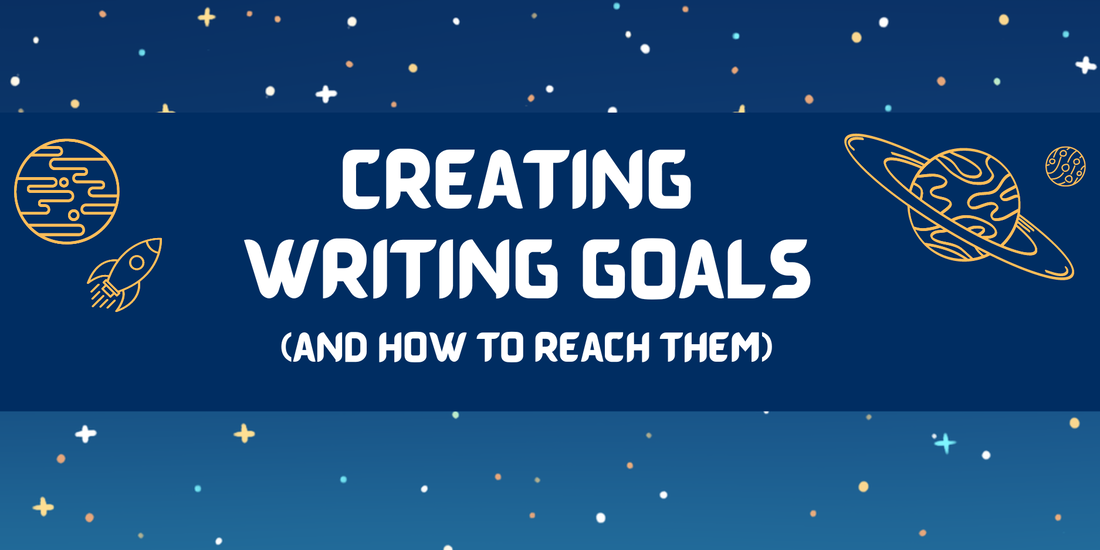|
Every writer has goals that they want to reach. Whether it's writing daily, finishing 1,000 words a week, editing a chapter a month, or sitting down and crunching out 1,667 words every day a month for NaNoWriMo. Staying motivated to reach those goals is one of the hardest parts of writing. Often (at least for me) writing gets pushed to the end of my daily to-do list. There's things I have to complete, things I should complete, and then things that I'd like to get done but that aren't a priority. And this is usually where my writing goals end up. I'd like to get 500 words written or edited every day, but by the time I finish all of my have-to's and should-do's on my list, I just don't have the energy. Earlier this year, there was a period of a few months where I didn't even open my writing program. The busier I got, the less time I seemed to spend writing, or even thinking about writing, because the more I fell behind in my 500-words-a-day, the less I wanted to even look at an empty document. It seemed so impossible to catch up on lost time. So I decided to change the way I thought about my word-count goals, in order to stop feeling so guilty when life got in the way of my daily word count. daily goals vs monthly goalsMy life is never going to be completely empty. As much as I might want to be able to have writing be my priority, I'm always going to have other things that will take time away from completing my 500 words every day, so my writing goals should reflect that. (If you're someone who can focus on writing and make time for it every day, that's absolutely amazing and you should keep up on that. But for any one else who struggles, then maybe this approach can help you too.) Rather than a daily word-count goal, I switched to a weekly word-count goal. And a much smaller word-count goal: 1,000 words a week. If I broke that down into days, that's less than 150 words a day, which isn't intimidating at all. But the whole point of a weekly goal is that I don't have to write every day. I could only write 2 days a week, and as long the word-count from those 2 days added up to my weekly goal of 1,000 words, then I've reached my goal. Because there will always always always be days that I just do not conceivably have time to write, and accounting for them means I'm less likely to fall behind and loose traction. I could write all of the words in a weekend, or do a small bit over a few days, or crunch and get it all out in one day. And it's been working. For the most part, I reach my goals, and am steadily making progress towards my overarching goal of finishing the 2nd draft of my WIP. And I feel way less guilty when I don't have the time to write. In fact, even if I miss my weekly goal, it doesn't seem as big of a deal, and it's easy to pick it back up the next week and try again. (This is still a work in progress, though, so if anyone would like to share how they organize their writing goals to stay motivated, I'd love to hear other methods!) staying motivatedFor me, tracking my progress helps me keep up on it. Writing a book is such a huge endeavor that it can feel hopeless. When you're stuck fighting over a single sentence, then realize how many sentences, paragraphs, chapters, and pages you still have to do before you finish . . . it can be overwhelming. So tracking how much I've done and how much there is to go is extremely important for my motivation. I've tried a handful of trackers (the one on the NaNoWriMo website is probably my favorite digital one available) but I like having paper in front of me more than anything. I couldn't find a tracker that fit how I wanted to write, so I made one. word-count goal trackerTo help with staying on track with writing goals, I made a downloadable and printable Writing Goal Tracker. It doesn't matter if your goal is world-building, writing a first draft of your novel, or revising for the 15th time. This tracker consists of a single page to write out your goal, state your motivation behind the goal, and a simple progress bar to fill in as you go and keep you motivated. This page (as simple as it is) helps me the most. It's on the wall above my computer, and seeing that progress bar slowly being filled in goes a long way to keeping me writing away at my book. I also made two different ways to keep track of word-counts: a Monthly Word-Count Tracker (which can be used alongside NaNoWriMo) and a Writing Session Tracker. I mostly use the Monthly Tracker, but the Writing Session one can be useful for more focused bursts of energy (for instance, if I wanted to get a lot done on a weekend). I made all 3 pages available on my Etsy shop, for anyone else who'd like to try it out. If you do end up getting it, I'd love to know if you liked my design, or if you have any ideas for how it could be even better! What's your favorite way to track your word-count, and how to do measure your writing goal progress?
0 Comments
Leave a Reply. |
|




 RSS Feed
RSS Feed
